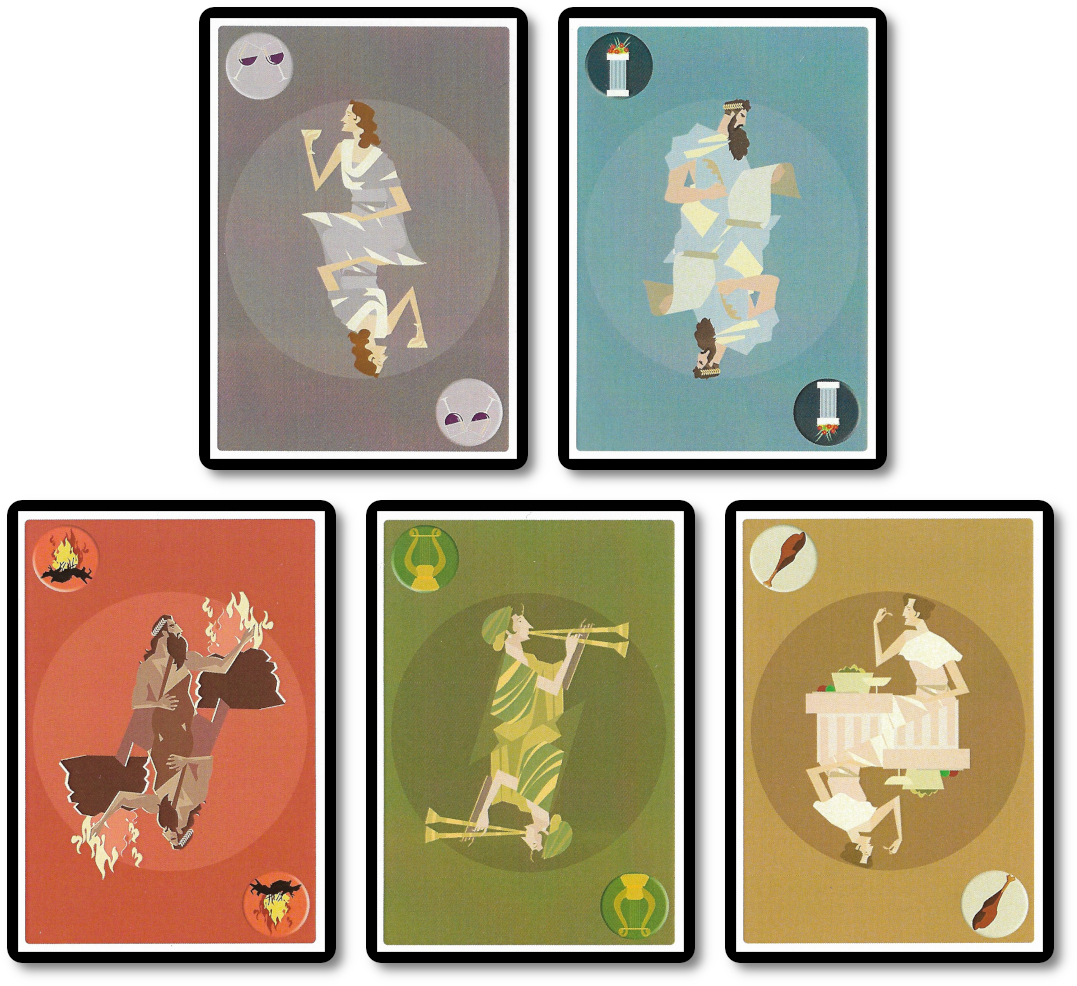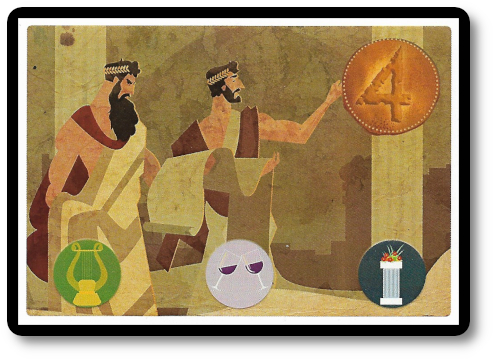Please Take Note: This is a review of the final game, but it might change slightly based on the success of the Kickstarter campaign. The game is being reviewed on the components and the rules provided with the understanding that “what you see is not what you might get” when the game is published. If you like what you read and want to learn more, we encourage you to visit the game’s website or the Kickstarter campaign. Now that we have all that disclaimer junk out of the way, on with the review.

The Basics:
- For ages 8 and up (publisher suggests 12+)
- For 2 to 4 players
- Approximately 20 minutes to complete
Geek Skills:
- Active Listening & Communication
- Counting & Math
- Logical & Critical Decision Making
- Pattern/Color Matching
- Strategy & Tactics
- Hand/Resource Management
Learning Curve:
- Child – Easy
- Adult – Easy
Theme & Narrative:
- Plan a feast worthy of an Emporer
Endorsements
- Gamer Geek mixed!
- Parent Geek approved!
- Child Geek approved!
Overview
American author and television personality, Ted Allen, said “Planning a dinner party in a way that you’re actually capable of getting it done without panicking is important. It’s bad hospitality for the host to be freaked out.” Good advise, but what if the success of the dinner party determined if you lived or died? Now that is stressful and worth panicking about. In this game, the Emporer’s previous party planner has made their last mistake, losing their job and their head. Now the position is open and you hope to please the Emporer with your elite party planning skills.
Triumphus, designed by James Browne, Laura Varney and to be published by Fairview Games, will reportedly be comprised of 75 Supply cards and 25 Reward cards. As this is a review of a prepublished game, I cannot comment on the game component quality. The provided artwork is excellent, being a mix of modern-day aesthetics leveraging the ancient Greco Roman art style.
Let’s Get This Party Started
To set up the game, first separate the cards into two different piles using the color of the card’s back to quickly complete the task. One will be the Supply cards and the other will be the Reward cards. Shuffle both piles of cards separately.
Second, place the Reward cards face-down to create the Rewards draw deck. From the Rewards draw deck, draw and place face-up in a row the first five cards.
Third, deal to each player five Supply cards, face-down. These cards are the player’s starting hand. The cards should be kept a secret until played. Place the remaining Supply cards face-down and next to the Rewards draw deck. This is the Supply draw deck.
That’s it for game set up. The player left of the dealer goes first.
Party Hard
Triumphus is played in turns with no set number of turns in the game. On a player’s turn, the can take up to three actions. Each action is optional and can be done in any order, but each action can only be taken once per turn. Each of the actions available to the player is summarized here. A player also has the option of not taking any actions and skipping their turn if they see no advantage in taking it.
Exchange
The Exchange action allows the player to take one to three cards from their hand, reveal them to their opponents, and then discard face-up in a pile next to the Supply draw deck. The player then draws the same number of previously discarded cards from the Supply draw deck, adding them back to their hand. The newly added cards are not revealed to the player’s opponents. If the Supply draw deck is exhausted, the discard pile is shuffled and placed face-down to create the new Supply draw deck.
Collect a Reward
Each Supply card represents one essential element of a great feast. These include wine, decorations, offerings, entertainment, and food.

Each of the available and to be collected Reward cards have three to four icons that match one or more of the Supply card icons. If a player wants to collect an available reward, they play Supply cards from their hand and demonstrate to their opponents that the needed supplies match. If they do, the player collects the Reward card and places it in front of them, face-up. The played Supply cards are then discarded face-up to the discard pile. A new Reward card is drawn to replace the previously collected Reward card.
For example, the following Reward card requires one entertainment, one wine, and one decoration. This results in a retelling of the good deeds done during the Emporer’s rule (thematically speaking) and a possible four points at the end of the game.

Sell a Reward
If a player has previously collected a Reward card (either during their current turn or during a previous turn), they may sell it. This is done by flipping over a previously collected Reward card. The Reward card’s value is the number of Supply cards the player now draws and adds to their hand. For example, the above Reward card, if sold, would allow the player to draw four Supply cards.
Sold Reward cards lose their value once sold and are flipped face-down. Instead of the numeric value shown on the card’s face, a sold Reward card is only worth one point each. All sold Reward cards still remain in front of their owning player.
After the player finishes taking their actions (if any), they must discard down to no more than 10 Supply cards in their hand. The player decides what Supply cards to discard. This completes the player’s turn. The next player in the turn order sequence now takes their turn.
Closing Time
The game ends when the last available Reward card is collected by a player. Each player now calculates the points they earned. Each face-up collected Reward card is worth the point value shown (from four to seven points) and each face-down Reward card is worth one point. The player with the most points wins the game and becomes the Emporer’s new feast planner.
To learn more about Triumphus, visit the game’s website or the Kickstarter campaign.
Final Word
 The Child Geeks enjoyed the game, finding it to be intuitive to play and fast. Very fast. The first game took an average of about 20 minutes. All subsequent games took about 15 minutes. The game designers have done an outstanding job of streamlining the gameplay, making each player’s turn at the table a quick exercise in decision making with little to be overly concerned with. According to one Child Geek, “What I like most about the game is that there is always something to do and nothing you do feels like it is bad.” Analysis paralysis (or “vapor lock”, as I like to call it) is almost non-existent in Tripumphus. What a player can and cannot do is obvious and the game doesn’t punish a player for not thinking ahead. Another Child Geek said, “I like the art and I like playing it. It was fast.” It really is. When the last party was planned, the Child Geeks all agreed that Triumphus was a triumph.
The Child Geeks enjoyed the game, finding it to be intuitive to play and fast. Very fast. The first game took an average of about 20 minutes. All subsequent games took about 15 minutes. The game designers have done an outstanding job of streamlining the gameplay, making each player’s turn at the table a quick exercise in decision making with little to be overly concerned with. According to one Child Geek, “What I like most about the game is that there is always something to do and nothing you do feels like it is bad.” Analysis paralysis (or “vapor lock”, as I like to call it) is almost non-existent in Tripumphus. What a player can and cannot do is obvious and the game doesn’t punish a player for not thinking ahead. Another Child Geek said, “I like the art and I like playing it. It was fast.” It really is. When the last party was planned, the Child Geeks all agreed that Triumphus was a triumph.
 The Parent Geeks were also pleased with the game. Especially the casual gamers. According to one Parent Geek, “This is an easy game to get on the table. Small footprint and engaging gameplay. I can see this coming with the family when we go on trips or being plopped on the table at home when the family wants to play a game.” With less than two minutes to set up the game and easy rules, Triumphus is most certainly a card game that is easy to get to the table. The more elite Parent Geeks, however, started to see a few flaws. According to one Parent Geek, “I’d play this as a filler or with my kids, but when I want to play a game with adults, I would like to play something I feel I have a bit more control over.” This Parent Geek is referring to the random elements of the gameplay. Players are always drawing random cards. For those who want more control over their hand, this aspect of the game was found to be a bit underwhelming. Regardless, the Parent Geeks found that Triumphus did the trick and was worth their time, resulting in a full endorsement.
The Parent Geeks were also pleased with the game. Especially the casual gamers. According to one Parent Geek, “This is an easy game to get on the table. Small footprint and engaging gameplay. I can see this coming with the family when we go on trips or being plopped on the table at home when the family wants to play a game.” With less than two minutes to set up the game and easy rules, Triumphus is most certainly a card game that is easy to get to the table. The more elite Parent Geeks, however, started to see a few flaws. According to one Parent Geek, “I’d play this as a filler or with my kids, but when I want to play a game with adults, I would like to play something I feel I have a bit more control over.” This Parent Geek is referring to the random elements of the gameplay. Players are always drawing random cards. For those who want more control over their hand, this aspect of the game was found to be a bit underwhelming. Regardless, the Parent Geeks found that Triumphus did the trick and was worth their time, resulting in a full endorsement.
 The Gamer Geeks found Triumphus to be fast, easy to get to the table, and about as interesting as a breath mint after eating an onion. Which is to say, it did the trick and was then quickly forgotten. According to one Gamer Geek, “A well-designed game that I would play as a filler once. It is not a bad game by any means, but is most certainly not a game I would be itching to get to the table.” Another Gamer Geek said, “These games were great when I was a kid and just starting in the hobby. As a gamer who looks for games that require deep gameplay, strategy, and tactics, this one doesn’t do it for me.” The randomness of the game was tolerable to all the Gamer Geeks as long as they played the game once. After they played it twice and more, they started to whine. When the last party platter was served and there were no more pizza rolls to eat, the Gamer Geeks gave Triumphus a mixed review, finding it to be a good game that was worth playing only once.
The Gamer Geeks found Triumphus to be fast, easy to get to the table, and about as interesting as a breath mint after eating an onion. Which is to say, it did the trick and was then quickly forgotten. According to one Gamer Geek, “A well-designed game that I would play as a filler once. It is not a bad game by any means, but is most certainly not a game I would be itching to get to the table.” Another Gamer Geek said, “These games were great when I was a kid and just starting in the hobby. As a gamer who looks for games that require deep gameplay, strategy, and tactics, this one doesn’t do it for me.” The randomness of the game was tolerable to all the Gamer Geeks as long as they played the game once. After they played it twice and more, they started to whine. When the last party platter was served and there were no more pizza rolls to eat, the Gamer Geeks gave Triumphus a mixed review, finding it to be a good game that was worth playing only once.
 Triumphus is fast and lean, but not mean. It’s very casual with each turn being a simple exercise of answering the question “what do I want to do now?” with the answer being obvious. Sure, you could plan ahead, but the game is random and the most important choices to make happen towards the end. The first half of the game is all about collecting whatever Reward cards are available without much in the way of thought. The second half, however, uff…things change.
Triumphus is fast and lean, but not mean. It’s very casual with each turn being a simple exercise of answering the question “what do I want to do now?” with the answer being obvious. Sure, you could plan ahead, but the game is random and the most important choices to make happen towards the end. The first half of the game is all about collecting whatever Reward cards are available without much in the way of thought. The second half, however, uff…things change.
As the second half of the game starts, the number of Reward cards available are drastically reduced. Players now go from feast to famine. Each Reward card is worth hunting down and collecting. Better yet, players now have to make tough choices (relativly speaking to the game’s overall complexity) about how to leverage their previously collected Reward cards. They could sell them for more Supply cards, but that is a gamble since all Supply cards drawn are random. Still, players will take the chance because the game never feels heavy. This frees players up to simply have a good time, which they do.
I liked Triumphus. It’s a perfect example of how a game can be simple in its execution and fun at the table. You don’t need to count cards here and you don’t have to do much in the way of anything other than enjoy the company you keep at your gaming table. Due to the game being casual, conversation is easy to have without upsetting the gameplay cadence. For those who do want to take the game a bit more seriously, all points are visible and give the player a solid bit of info on where they stand against the competition. Nothing is hidden except random cards. Which players cannot account for anyway.
What you have here is a solid card game. Fast, fun, and casual. Perfect for a game filler, in my opinion, playing when traveling with the family, or friends come to visit and a game is in order. All our players found something they liked, but not all loved it. Which is fine. Triumphus never stays too long at the table to feel like an unwanted guest. Do give this card game about party planning a try to see if it’s the life of your next gaming party.
This is a paid for review of the game’s final prototype. Although our time and focus was financially compensated, our words are our own. We’d need at least 10 million dollars before we started saying what other people wanted. Such is the statuesque and legendary integrity of Father Geek which cannot be bought except by those who own their own private islands and small countries.



